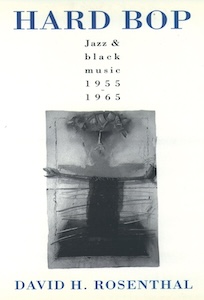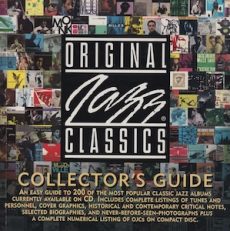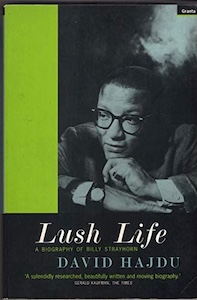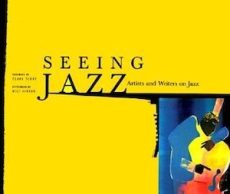
On The Bookshelf
Hard Bop: Jazz & Black Music 1955-1965
It’s nineteen fifty-something, in a dark, cramped, smoke-filled room. Everyone’s wearing black. And on-stage a tenor is blowing his heart out, a searching, jagged saxophone journey played out against a moody, walking bass and the swish of a drummer’s brushes. To a great many listeners–from Black aficionados of the period to a whole new group of fans today–this is the very embodiment of jazz. It is also quintessential hard bop.
In this, the first thorough study of the subject, jazz expert and enthusiast David H. Rosenthal vividly examines the roots, traditions, explorations and permutations, personalities and recordings of a climactic period in jazz history.
Beginning with hard bop’s origins as an amalgam of bebop and R&B, Rosenthal narrates the growth of a movement that embraced the heavy beat and bluesy phrasing of such popular artists as Horace Silver and Cannonball Adderley; the stark, astringent, tormented music of saxophonists Jackie McLean and Tina Brooks; the gentler, more lyrical contributions of trumpeter Art Farmer, pianists Hank Jones and Tommy Flanagan, composers Benny Golson and Gigi Gryce; and such consciously experimental and truly one-of-a-kind players and composers as Andrew Hill, Sonny Rollins, John Coltrane, Thelonious Monk, and Charles Mingus.
Hard bop welcomed all influences–whether Gospel, the blues, Latin rhythms, or Debussy and Ravel–into its astonishingly creative, hard-swinging orbit. Although its emphasis on expression and downright “badness” over technical virtuosity was unappreciated by critics, hard bop was the music of black neighborhoods and the last jazz movement to attract the most talented young black musicians.
Fortunately, records were there to catch it all. The years between 1955 and 1965 are unrivaled in jazz history for the number of milestones on vinyl. Miles Davis’s Kind of Blue, Charles Mingus’s Mingus Ah Um, Thelonious Monk’s Brilliant Corners, Horace Silver’s Further Explorations. Rosenthal gives a perceptive cut-by-cut analysis of these and other jazz masterpieces, supplying an essential discography as well. For knowledgeable jazz-lovers and novices alike, Hard Bop is a lively, multi-dimensional, much-needed examination of the artists, the milieus, and above all the sounds of one of America’s great musical epochs.
Hard Bop | Jazz & Black Music 1955~1965: 1992 | David H. Rosenthal
Oxford University Press

On The Bookshelf
Original Jazz Classics Collector’s Guide
An easy guide to 200 of the most popular classic jazz albums currently available on CD. Includes complete listings of tunes and personnel, cover graphics, historical and contemporary critical notes, selected biographies, and never-before-seen-photographs plus a complete numerical listing of OJCs on compact disc.
Original Jazz Classics Collector’s Guide: 1995
Fantasy Inc.

Daily Dose Of Jazz…
Adam Cordero was born on November 18, 1999 and grew up in Roslyn Heights, New York. He became captivated by the sounds of nature which he has incorporated in his compositions. Attending the New School for Jazz and Contemporary Music he graduated with a Bachelor of Fine Arts
Adam holds a BFA degree with high honors from The New School for Jazz and Contemporary Music. He is also an adjunct professor at the New School and teaches privately.
Cordero teaches his own studio of students privately and is an adjunct faculty member at The New School for Jazz & Contemporary Music. He has played the established jazz venues in New York City, and has toured internationally to Switzerland and South Korea.
His quintet, Arcadia, strives to unite people in the common cause of protecting the environment. Cordero is a leading founder of the music venue Julian’s NYC and the music label, Tidebloom Records.
Saxophonist, composer, educator, and multi-instrumentalist Adam Cordero, who also plays clarinet, bass clarinet, and flute, continues to perform, tour and record.
More Posts: bandleader,bassoon,clarinet,flute,saxophone

On The Bookshelf
Lush Life: A Biography Of Billy Strayhorn
Billy Strayhorn, one of the greatest composers in the history of American music, the creator of a body of work of standards like Take the A Train. Yet, as a composer with no stage presence many see him as overshadowed by his friend and collaborator Duke Ellington, with whom he worked with for the two and a half decades.
The songwriter and arranger was an integral component of the Harlem Renaissance and the evolution of jazz. Lush Life is a vibrant and absorbing account of the Strayhorn’s life and the times that other jazz musicians led in Harlem and Paris. While composing some of the most gorgeous American music of this century, Strayhorn labored under a complex agreement whereby Ellington took the bows for his work.
Fifty-one years from the date of his birth, Billy Strayhorn transitioned due to cancer and alcohol abuse. The small, shy black composer carried himself with singular style and grace as one of the few jazzmen to be openly homosexual. This biography has sparked an enthusiastic revival of interest in Billy Strayhorn’s work and is already acknowledged as a jazz classic.
Lush Life: 1996 | David Hajdu
Granta Publications

On The Bookshelf
Seeing Jazz: Artists & Writers On Jazz
Within these 144 pages, Seeing Jazz is a showcase of 77 paintings, sculptures, drawings, collages, and photographs, accompanied by literary selections, that express the many moods of jazz. This is jazz, art, and literature in concert.
In this museum of artists are, but not limited to, include Romare Bearden, Sam Gilliam, James Phillips, Miles Davis, Gjon Mili, Jacob Lawrence, Stuart Davis, Ann Tanksley, Archibald Motley, Ed Love, Gordon Parks, JeanMichel Basquiat, Henri Matisse, William Claxton, Stuart Davis, Ed Love, and Man Ray,
A representation of authors include Julio Cortazar, Ntozake Shange, Ralph Ellison, and Toni Morrison. The Foreword was written by trumpeter Calrk Terry, the Afterword by bassist Milt Hinton. The introduction is by Columbia University jazz scholar Robert O’Meally.
Whether it is improvisation, spontaneity, fusion, freedom or innovation, jazz has always been about more than music, and the ideas and moods of jazz have ruffled the minds of creatives throughout every category of the arts.
Seeing Jazz: 1997 | Marquette Folley-Cooper, Deborah Macanic, Janice McNeil
Chronicle Books | Smithsonian Institution Traveling Exhibition Service



